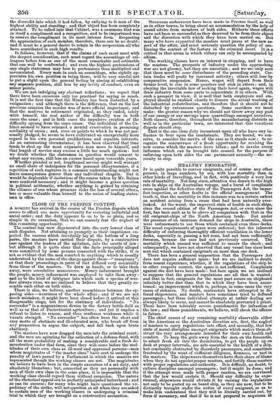CLOSE OF THE PRESTON CONTEST.
A MOMENT has arrived in the course of the Preston dispute which seems to afford one more opportunity for restoring industrial and social order; and the duty appears to us to be so plain, and so simple in its execution, that we can scarcely fear the neglect of this remaining opportunity. The contest has now degenerated into the very lowest class of such disputes. Not attaining so promptly as their impatience ex- pected the success which inevitably, lay at the bottom of a long purse, the masters have carried their 'dispute' by a constructive case against the leaders of the agitation, into the courts of law : but although it is quite clear that the facts principally alleged wererionimitted by some persons connected with the strike, it is not so evident that the men resorted to anything which is usually understood by the name of the charge against them—" conspiracy"; or that their proceedings in point of fact differed very essentially from those of the masters. To draw in hands, or to take them away, were correlative manceuvres. Money inducement brought the people, money inducement was employed to take them away : and as to the kind of intrigues into which such a species of war- fare always runs, we are inclined to believe that they greatly re- semble each other on both sides.
There is also, we believe, another resemblance between the op- posing sides—weariness of the whole affair ; and if we are not much mistaken, it might have been closed before it arrived at this disagreeable stage, but for the obstinacy of individuals. "No surrender" is a magnanimous device in the factory battle-field as well as on that of Protectionist agriculture ; and yet it implies a refusal to listen to reason, and thus confesses weakness while it vaunts strength. "No surrender" has often been the short and easy motto of obstinate and ill-educated men, who break off from any proposition to argue the subject, and fall back upon brute obstinacy.
The masters have now dragged the men into the criminal court ; and the men are agitating for the collection of a defence-fund, with all the more probability of making a considerable and a fresh de- monstration under that form, since they will come before the mul- titudes of their own class as ill-used and oppressed persons—men whom magistrates of "the master class" have sent to undergo the penalty of laws passed by a Parliament in which the masters are represented though the working classes are not The magistrates we believe to have been in the simple execution of a set duty, and absolutely blameless ; but, connected as they are personally with men of their own clam in the same place, it is impossible that the working class should regard them without suspicion. The nature of the rhetorical appeal can be perfectly anticipated beforehand ; and so can its success ; for many who might have questioned the ei- pediency of the strike, will not question at all when they are asked to sustain men of the working classes in undergoing a criminal trial to which they are brought on a constructive accusation.
Strenuous endeavours have been made in Preston itself, as well as in other towns, to bring about an accommodation by the help of sound advice from members of both sides. Hitherto these efforts have not been so successful as they deserved to be from their object and the discretion with which they have been carried on. But many who have supported the masters must pause at the new, as- pect of the affair, and must seriously question the policy of con- tinuing the contest of the factory in the criminal court. It is a contest in that arena in which victory can only be accompanied by odium.
The working classes have an interest in stopping, and so have the masters. The prospects of industry under the approaching war are not gloomy, but they are uncertain ; and we are only sure that there must be some disturbance of the preceding state. Cer- tain trades will profit by increased activity; others will lose by comparative suspension. Hence wages will depart from their former level, to rise in some (Limiters and sink in others ; and, in obeying the inevitable law of seeking their level again, wages will draw industry from some parts to concentrate it in others. With such a prospect in view, it is well that both employers and em- ployed should be enabled clearly to discern the actual working of the industrial redistribution, and therefore that it should not be disturbed by extraneous questions. Some sacrifices we must make ; the greater reason why we should not throw away any part of our energy or our savings upon quarrellings amongst ourselves. Both classes, therefore, throughout the manufacturing districts as well as in the particular town, are interested that this vexatious dispute should stop. That is the one clear duty incumbent upon all who have any in- fluence to bear upon the combatants. They are bound, we con- ceive, to consider the merits of the case as it stands now ; to re- cognize the concurrence of a fresh opportunity for revising the new course which the masters have taken ; and to invoke every influence which can be brought into council for the purpose of enforcing upon both sides the one paramount necessity—the ne- cessity to stop.


































 Previous page
Previous page